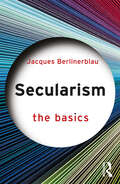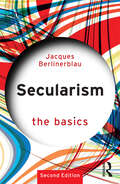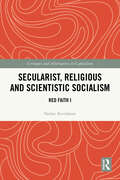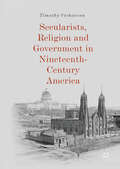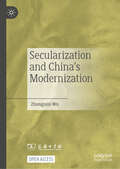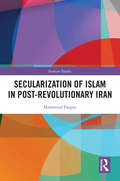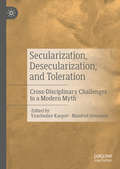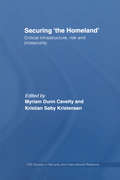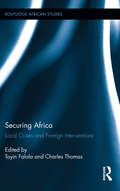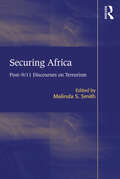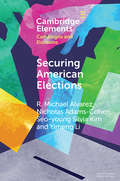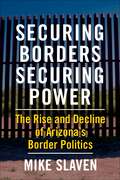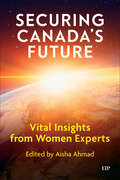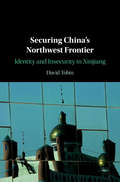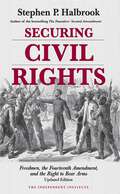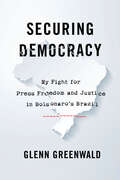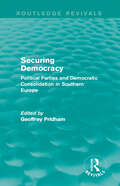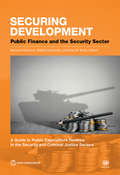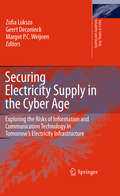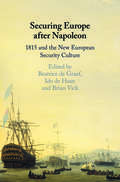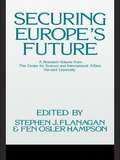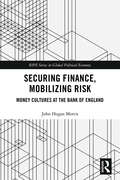- Table View
- List View
Secularism: The Basics (The Basics)
by Jacques BerlinerblauSecularism: The Basics is a concise and engaging introduction to confusing and contradictory public discussions of secularism across the globe. “Secularism” must be the most confused and convoluted term in the entire global political lexicon. From New York to Paris, to Istanbul, to Addis Ababa, to New Delhi, to Montevideo, there are countless examples of politicians, religious leaders and journalists, invoking the S-word in heated debates about public education, gender, sex, national symbols, and artistic freedom. In this lively and lucid book, Jacques Berlinerblau addresses why secularism is defined in so many ways and why it so ignites people’s passions. In so doing, he explores the following important questions: What does secularism mean? Why should we care about this idea? What are the different types of secularism and what are their histories? What are the basic principles of political secularisms? Why are secularism and Atheism often confused? What is the relationship between secularism and LGBTQ rights? What opposition are secularisms up against? What does the future hold for a concept millennia in the making, but only really operationalized in the twentieth century? With a glossary of key terms, case studies, informative tables, and suggestions for further reading throughout, the book considers key philosophical, religious, anti-religious, post-modern and post-colonial arguments around secularism. This book is an ideal starting point for anyone seeking a readable introduction to the often-conflicting interpretations of one of our era’s most complex and controversial ideas.
Secularism: The Basics (The Basics)
by Jacques BerlinerblauSecularism: The Basics is a concise and engaging introduction to confusing and contradictory public discussions of secularism across the globe. In this lively and lucid book, Jacques Berlinerblau addresses why secularism is defined in so many ways and why it so ignites people’s passions. In so doing, he explores the following important questions: What does secularism mean? Why should we care about this idea? What are the different types of secularism and what are their histories? What are the basic principles of political secularisms? Why are secularism and Atheism often confused? What is the relationship between secularism and LGBTQ rights? What opposition are secularisms up against? What does the future hold for a concept millennia in the making, but only really operationalized in the last century and a half? This thoroughly updated new edition includes two new chapters on African Secularisms and the importance of Mexico in the history of political secularism. With a glossary of key terms, new and updated case studies throughout, informative tables, and suggestions for further reading, the book considers key philosophical, religious, anti-religious, and post-colonial arguments around secularism. This book continues to be an ideal starting point for anyone seeking a readable introduction to the often-conflicting interpretations of one of our era’s most complex and controversial ideas.
Secularist, Religious and Scientific Socialism: Red Faith I (Critiques and Alternatives to Capitalism)
by Stefan ArvidssonThis book explores the various ways in which socialists have understood the relationship between their political beliefs and different religious and philosophical traditions.Considering the rise of secularism and the view that politics and life stances are two very different spheres, it moves to examine the thought of those who believed that faith and politics are as separate as night and day, those who, on the contrary, believed that socialism rests firmly on a religious foundation, and those who have argued that socialism’s foundations are solidly scientific and therefore atheist. An examination of a range of perspectives on socialism as a political ideology, a deep conviction and even a form of faith, Secularist, Religious, and Scientific Socialism explores the aesthetic, ethical, and existential ideals that have ignited the hearts of socialists, describing in detail how these ideals have been expressed in political activism, cultural forms, and ways of living.It will therefore appeal to scholars of intellectual history, political theory, political philosophy, and cultural history with interests in socialism and religion.
Secularists, Religion and Government in Nineteenth-Century America
by Timothy VerhoevenThis book shows how, through a series of fierce battles over Sabbath laws, legislative chaplains, Bible-reading in public schools and other flashpoints, nineteenth-century secularists mounted a powerful case for a separation of religion and government. Among their diverse ranks were religious skeptics, liberal Protestants, members of minority faiths, labor reformers and defenders of slavery. Drawing on popular petitions to Congress, a neglected historical source, the book explores how this secularist mobilization gathered energy at the grassroots level. The nineteenth century is usually seen as the golden age of an informal Protestant establishment. Timothy Verhoeven demonstrates that, far from being crushed by an evangelical juggernaut, secularists harnessed a range of cultural forces—the legacy of the Revolutionary founders, hostility to Catholicism, a belief in national exceptionalism and more—to argue that the United States was not a Christian nation, branding their opponents as fanatics who threatened both democratic liberties as well as true religion.
Secularization and China's Modernization
by Zhongmin WuThis open access book examines from the perspective of secularization. Since the publication of Max Weber's Protestant Ethics and the Spirit of Capitalism, how to realize modernization in developing countries has become an urgent problem to be demonstrated. Secularization has becoming endogenous power for Chinese modernization procedure, especially since 1978. However, to understand the foundation of secularization, it is inevitable to tracing back to Chinese history. This approach contains critical analysis and profound insight to illuminate the essence of secularization in contemporary Chinese context. The author also applies the comparative approach: by comparing with Protestant ethics in many Western European countries, the significance of secularization has been emphasized. The widespread and intense secularization boosts China into the trend modernization that covers nearly all aspects of society. This book is in need for those who intended to discern the truth of Chinese modernization. It is also a key tool of reflecting modernization and development in a broader sense.
Secularization of Islam in Post-Revolutionary Iran (Iranian Studies)
by Mahmoud PargooExamining the trajectory of the secularization of Islam in Iran, this book explains how efforts to Islamize society led, self-destructively, to its secularization. The research engages a range of debates across different fields, emphasizing the political and epistemological instability of the basic categories such as Islam, Sharia, and secularism. The volume is an interdisciplinary study of both the history of Islamic revival and Khomeini’s very specific merger of Islamic law and mysticism. It traces back the process of secularization to the early encounter of Iranian intellectuals with Europeans and adoption of their fundamental framework in an Islamic guise. The process continued until the Islamic Revolution of Iran in 1979, when Khomeini tried to substantively de-secularize Iranian social imaginaries. His attempts were not followed up by his followers, who vigorously reinstated the previous trend, after his death, resulting in a polity that is mostly secular but with Islamic ornaments. Bringing together area studies (Iran), religious studies (Islam), and political theory (secularism), this interdisciplinary volume places findings in a broader narrative that is both specific to Iran and broad enough to engage a global readership.
Secularization, Desecularization, and Toleration: Cross-Disciplinary Challenges to a Modern Myth
by Manfred Svensson Vyacheslav KarpovThis book challenges the modern myth that tolerance grows as societies become less religious. The myth inseparably links the progress of toleration to the secularization of modern society. This volume scrutinizes this grand narrative theoretically and empirically, and proposes alternative accounts of the varied relationships between diverse interpretations of religion and secularity and multiple secularizations, desecularizations, and forms of toleration. The authors show how both secular and religious orthodoxies inform toleration and persecution, and how secularizations and desecularizations engender repressive or pluralistic regimes. Ultimately, the book offers an agency-focused perspective which links the variation in toleration and persecution to the actors of secularization and desecularization and their cultural programs.
Securing 'the Homeland': Critical Infrastructure, Risk and (In)Security (CSS Studies in Security and International Relations)
by Kristian Søby Kristensen Myriam Anna DunnThis edited volume uses a ‘constructivist/reflexive’ approach to address critical infrastructure protection (CIP), a central political practice associated with national security. The politics of CIP, and the construction of the threat they are meant to counter, effectively establish a powerful discursive connection between that the traditional and normal conditions for day-to-day politics and the exceptional dynamics of national security. Combining political theory and empirical case studies, this volume addresses key issues related to protection and the governance of insecurity in the contemporary world. The contributors track the transformation and evolution of critical infrastructures (and closely related issues of homeland security) into a security problem, and analyze how practices associated with CIP constitute, and are an expression of, changing notions of security and insecurity. The book explores aspects of ‘securitisation’ as well as at practices, audiences, and contexts that enable and constrain the production of the specific form of governmentality that CIP exemplifies. It also explores the rationalities at play, the effects of these security practices, and the implications for our understanding of security and politics today.
Securing Africa: Local Crises and Foreign Interventions (Routledge African Studies #12)
by Toyin Falola Charles ThomasAfrica has been and currently is the site of numerous conflicts and crises. Authors previously wrote of these as specifically African problems or the problems of Europeans in Africa, but newer scholarship on other aspects of Africa has come to stress the interconnectness of Africa and the wider world. Still, it has often been limited to studies of isolated instances within African countries, with little-to-no connection to greater patterns of international power and violence. This volume explores the historical and present local and international dimensions of the myriad security crises in Africa, from the role of international relations during liberation to multination efforts against piracy.
Securing Africa: Post-9/11 Discourses on Terrorism
by Malinda S. SmithThis meticulously researched, forcibly argued and accessibly written collection explores the many and complex ways in which Africa has been implicated in the discourses and politics of September 11, 2001. Written by key scholars based in leading institutions in Canada, the United States, the Middle East and Africa, the volume interrogates the impact of post-9/11 politics on Africa from many disciplinary perspectives, including political science, sociology, history, anthropology, religious studies and cultural studies. The essays analyze the impact of 9/11 and the 'war on terror' on political dissent and academic freedom; the contentious vocabulary of crusades, clash of civilizations, barbarism and 'Islamofascism'; alternative genealogies of local and global terrorism; extraordinary renditions to black sites and torture; human rights and insecurities; collapsed states and the development-security merger; and anti-terrorism policies from George W. Bush to Barack Obama. This is a much-needed meditation on historical and contemporary discourses on terrorism.
Securing America's Passenger-Rail Systems
by Brian A. Jackson K. Jack Riley Jeremy M. Wilson Paul Steinberg Mel EismanU.S. communities depend on reliable, safe, and secure rail systems. Each weekday, more than 12 million passengers take to U.S. railways. This book explains a framework for security planners and policymakers to guide cost-effective rail-security planning, specifically for the risk of terrorism. Risk is a function of threat, vulnerability, and consequences. This book focuses on addressing vulnerabilities and limiting consequences.
Securing American Elections: How Data-Driven Election Monitoring Can Improve Our Democracy (Elements in Campaigns and Elections)
by R. Michael Alvarez Nicholas Adams-Cohen Seo-young Silvia Kim Yimeng LiThe integrity of democratic elections, both in the United States and abroad, is an important problem. In this Element, we present a data-driven approach that evaluates the performance of the administration of a democratic election, before, during, and after Election Day. We show that this data-driven method can help to improve confidence in the integrity of American elections.
Securing Approval: Domestic Politics & Multilateral Authorization for War (Chicago Series On International And Dome Ser.)
by Terrence L. ChapmanAmong the most momentous decisions that leaders of a state are called upon to make is whether or not to initiate warfare. How their military will fare against the opponent may be the first consideration, but not far behind are concerns about domestic political response and the reaction of the international community. Securing Approval makes clear the relationship between these two seemingly distinct concerns, demonstrating how multilateral security organizations like the UN influence foreign policy through public opinion without ever exercising direct enforcement power. While UN approval of a proposed action often bolsters public support, its refusal of endorsement may conversely send a strong signal to domestic audiences that the action will be exceedingly costly or overly aggressive. With a cogent theoretical and empirical argument, Terrence L. Chapman provides new evidence for how multilateral organizations matter in security affairs as well as a new way of thinking about the design and function of these institutions.
Securing Approval: Domestic Politics and Multilateral Authorization for War
by Terrence L. ChapmanAmong the most momentous decisions that leaders of a state are called upon to make is whether or not to initiate warfare. How their military will fare against the opponent may be the first consideration, but not far behind are concerns about domestic political response and the reaction of the international community. Securing Approval makes clear the relationship between these two seemingly distinct concerns, demonstrating how multilateral security organizations like the UN influence foreign policy through public opinion without ever exercising direct enforcement power. While UN approval of a proposed action often bolsters public support, its refusal of endorsement may conversely send a strong signal to domestic audiences that the action will be exceedingly costly or overly aggressive. With a cogent theoretical and empirical argument, Terrence L. Chapman provides new evidence for how multilateral organizations matter in security affairs as well as a new way of thinking about the design and function of these institutions.
Securing Borders, Securing Power: The Rise and Decline of Arizona's Border Politics
by Mike SlavenIn 2010 Arizona enacted Senate Bill 1070, the notorious “show-me-your-papers” law. At the time, it was widely portrayed as a draconian outlier; today, it is clear that events in Arizona foreshadowed the rise of Donald Trump and underscored the worldwide trend toward the securitization of migration—treating immigrants as a security threat. Offering a comprehensive account of the SB 1070 era in Arizona and its fallout, this book provides new perspective on why policy makers adopt hard-line views on immigration and how this trend can be turned back.Tracing how the issue of unauthorized migration consumed Arizona state politics from 2003 to 2010, Mike Slaven analyzes how previously extreme arguments can gain momentum among politicians across the political spectrum. He presents an insider account based on illuminating interviews with political actors as well as historical research, weaving a compelling narrative of power struggles and political battles. Slaven details how politicians strategize about border politics in the context of competitive partisan conflicts and how securitization spreads across parties and factions. He examines right-wing figures who pushed an increasingly extreme agenda; the lukewarm center-right, which faced escalating far-right pressure; and the nervous center-left, which feared losing the center to border-security appeals—and he explains why the escalation of securitization broke down, yielding new political configurations. A comprehensive chronicle of a key episode in recent American history, this book also draws out lessons that Arizona’s experience holds for immigration politics across the world.
Securing Canada’s Future: Vital Insights from Women Experts (UTP Insights)
by Aisha AhmadAfter decades of uncontested dominance, the era of American hegemony is ending and a new multipolar world order is emerging in its place. This transformation is also occurring alongside uncontrolled climate change and the development of volatile new technologies. Together, these factors dramatically complicate the global threat landscape. Securing Canada’s Future offers a comprehensive analysis of the most serious challenges that Canada will face in the near future. Written by leading Canadian women scholars and security experts, this collection covers the most critical risks and threats on the horizon, including rising Chinese power, resurgent Russian aggression, escalating competition in the Arctic, the near irreversibility of climate change, disaster management and mitigation, evolving cybersecurity threats, and gendered violence. Securing Canada’s Future explores what this future threat landscape will look like for Canadians and shows how Canada can prepare for and mitigate upcoming risks. This practical, forward-thinking volume maps out the most urgent national and international security issues that Canada is destined to face in the foreseeable future.
Securing China's Northwest Frontier: Identity and Insecurity in Xinjiang
by David TobinIn the first study to incorporate majority Han and minority Uyghur perspectives on ethnic relations in Xinjiang following mass violence during July 2009, David Tobin analyses how official policy shapes identity and security dynamics on China's northwest frontier. He explores how the 2009 violence unfolded and how the party-state responded to ask how official identity narratives and security policies shape practices on the ground. Combining ethnographic methodology with discourse analysis and participant-observation with in-depth interviews, Tobin examines how Han and Uyghurs interpret and reinterpret Chinese nation-building. He concludes that by treating Chinese identity as a security matter, the party-state exacerbates cycles of violence between Han and Uyghurs who increasingly understand each other as threats.
Securing Civil Rights: Freedmen, the Fourteenth Amendment, and the Right to Bear Arms
by Stephen P. HalbrookStephen Halbrook's groundbreaking study of freed slaves and the right to bear arms in the aftermath of the Civil War, cited in Supreme Court cases, now with a new foreword by Robert J. Cottrol.What did it mean to take civil rights seriously—especially the &“right to bear arms&”—in the years following the abolition of slavery? By quoting legislative debates, Congressional hearings on Ku Klux Klan violence, and newspapers and law books of the time, constitutional scholar Stephen Halbrook shows that both supporters and opponents of the Fourteenth Amendment (1868) believed that it protected all Bill of Rights guarantees—especially the Second Amendment—from infringement by the states. From the Freedmen&’s Bureau Act of 1866 to the Supreme Court&’s decision in United States v. Cruikshank (1876), Halbrook paints a vivid portrait of a political and legal system grappling with the true meaning of civil rights. &“Trusting ex-slaves to own firearms was, by any definition, the cutting edge in true belief in civil rights,&” Halbrook writes. &“It remains to be seen whether contemporary society will accommodate the same rights of the freedmen that the Framers of the Fourteenth Amendment sought to guarantee.&” Although Halbrook concentrates on the right to keep and bear arms, he also includes a comprehensive analysis of the general topic of the relationship between the Bill of Rights and the state governments after the ratification of the Fourteenth Amendment. Cited by both the U.S. Supreme Court in its historic landmark decision in the McDonald case (2010) and the Washington Supreme Court in State of Washington v. Christopher William Sieyes case (2010) as the leading account of the relationship between the Second Amendment and the states during Reconstruction, Halbrook&’s insightful narrative will help a larger audience better understand why earlier generations of Americans viewed the right to bear arms as essential for securing civil rights.
Securing Democracy: My Fight for Press Freedom and Justice in Brazil
by Glenn GreenwaldIn this riveting follow-up to his acclaimed international bestseller No Place to Hide, Glenn Greenwald documents the courageous fight for press freedom in Brazil, where authoritarianism and rampant corruption threaten the most fundamental principles of democracy.In 2019, award-winning journalist Glenn Greenwald writes in his gripping new book, “a series of events commenced that once again placed me at the heart of a sustained and explosive journalistic controversy.” New reporting by Greenwald and a team of Brazilian journalists had brought to light stunning information about grave corruption, deceit, and wrongdoing by the most powerful political actors in Brazil, his home since 2005. These stories, based on a massive trove of previously undisclosed telephone calls, audio, and text shared by an anonymous source, came to light only months after the January 2019 inauguration of Brazil’s far-right president, Jair Bolsonaro, an ally of U.S. President Donald Trump.The revelations “had an explosive impact on Brazilian politics” (Guardian) and prompted serious rancor, including direct attacks by President Bolsonaro himself, and ultimately an attempt by the government to criminally prosecute Greenwald for his reporting. “A wave of death threats — in a country where political violence is commonplace — have poured in, preventing me from ever leaving my house for any reason without armed guards and an armored vehicle,” Greenwald writes.Securing Democracy takes readers on a gripping journey through Brazilian politics as Greenwald, his husband, the left-wing congressman David Miranda, and a powerful opposition movement courageously challenge political corruption, homophobia, and tyranny. Most vitally, Greenwald demonstrates the importance of independent journalism in holding governments to account, reversing injustices, and ultimately securing the freedoms of democracy.
Securing Democracy: Political Parties and Democratic Consolidation in Southern Europe (Routledge Revivals)
by Geoffrey PridhamWhen this book first published in 1990, several ‘new’ democracies were emerging in Southern Europe. Italy, Portugal, Spain and Greece were generally seen as conforming to the western European model of liberal democracy. But the process of democratization is a gradual one, and each national democracy is moulded by its own political, social, and economic characteristics. In particular, the active role of national political parties is of prime importance. The contributors to this volume focus on party systems in the democracies of Greece, Spain and Portugal since the end of their authoritarian regimes, and on Italy in the post-war period. This title will be of interest to students of politics, European Studies, and development studies.
Securing Development: Public Finance and the Security Sector
by Bernard Harborne Paul M. Bisca William DorotinskySecuring Development: Public Finance and the Security Sector highlights the role of public finance in the delivery of security and criminal justice services. This book offers a framework for analyzing public financial management, financial transparency, and oversight, as well as expenditure policy issues that determine how to most appropriately manage security and justice services. The interplay among security, justice, and public finance is still a relatively unexplored area of development. Such a perspective can help security actors provide more professional, effective, and efficient security and justice services for citizens, while also strengthening systems for accountability. The book is the result of a project undertaken jointly by staff from the World Bank and the United Nations, integrating the disciplines where each institution holds a comparative advantage and a core mandate. The primary audience includes government officials bearing both security and financial responsibilities, staff of international organizations working on public expenditure management and security sector issues, academics, and development practitioners working in an advisory capacity.
Securing Electricity Supply in the Cyber Age: Exploring the Risks of Information and Communication Technology in Tomorrow's Electricity Infrastructure
by Margot P. Weijnen Zofia Lukszo Geert DeconinckThe electricity infrastructure is one of society's most critical infrastructures. The complexity of the electricity infrastructure system is increasing quickly, due to the increasing intensity of market-based power exchanges between electricity systems, the associated market restructuring and an increasing share of decentralized generation. As a consequence, the organizational complexity of power systems has exploded. At the same time, there is a shift in public and societal goals towards low-carbon and sustainable power generation. This will eventually require a drastic transformation of the industry. Increasingly, ICT is being depended upon for managing this infrastructure, for technical control and operation and for facilitating markets. A recent example is demand-side management, based on detailed metering of consumption and decentralized electricity generation. The mutual dependence of the electricity and the ICT infrastructures raises challenging questions in the areas of dependability, security and resilience. Examples include vulnerability to (cyber) attacks, avoiding and repairing technical failures and protecting data confidentiality, while guaranteeing accessibility. Therefore, better models and methods for protection against exploits of system vulnerabilities, whether accidental or intentional such as in cyber attacks, are called for. To address the above mentioned problems an advanced research workshop: "Electricity security in the cyber age: Managing the increasing dependence of the electricity infrastructure on ICT" was organized in the Netherlands in May 2009. The objective of the workshop was to contribute to the security of current and future electricity infrastructures by analyzing the risks that are caused by the increasing reliance upon ICT and investigating options for managing these risks. The book presents the contributions to the workshop by distinguished invited keynote speakers and participants from the international scientific and industrial community.
Securing Europe after Napoleon: 1815 and the New European Security Culture
by Beatrice De Graaf Ido De Haan Brian VickAfter the French Revolution and the Napoleonic Wars, the leaders of Europe at the Congress of Vienna aimed to establish a new balance of power. The settlement established in 1815 ushered in the emergence of a genuinely European security culture. In this volume, leading historians offer new insights into the military cooperation, ambassadorial conferences, transnational police networks, and international commissions that helped produce stability. They delve into the lives of diplomats, ministers, police officers and bankers, and many others who were concerned with peace and security on and beyond the European continent. This volume is a crucial contribution to the debates on securitisation and security cultures emerging in response to threats to the international order.
Securing Europe's Future: A Research Volume From The Center Of Science And International Affairs, Harvard University (Routledge Library Editions: Cold War Security Studies #42)
by Stephen Flanagan Fen Osler HampsonThis book analyses a number of emerging, enduring and neglected issues that will affect European security and the stability of the Atlantic Alliance in the near future.
Securing Finance, Mobilizing Risk: Money Cultures at the Bank of England (RIPE Series in Global Political Economy)
by John MorrisDrawing on the history of modern finance, as well as the sociology of money and risk, this book examines how cultural understandings of finance have contributed to the increased capitalization of the UK financial system following the Global Financial Crisis. Providing both a geographically-inflected analysis and re-appraisal of the concept of performativity, it demonstrates that financial risk management has a spatiality that helps to inform understandings and imaginaries of the risks associated with money and finance. The book traces the development of understandings of risk at the Bank of England, with an analysis that spans some 1,000 reports, documents and speeches alongside elite interviews with past and present employees at the central bank. The author argues that the Bank has moved from a relatively broad-brush approach to the risks being managed in the financial sector, to a greater preoccupation with the understanding and mapping of the mobilization of financial risk. The study of financial practices from a critical social sciences and humanities perspective has grown rapidly since the Global Financial Crisis and this book will be of interest to multiple subject areas including IPE, economic geography, sociology of finance and critical security studies.
